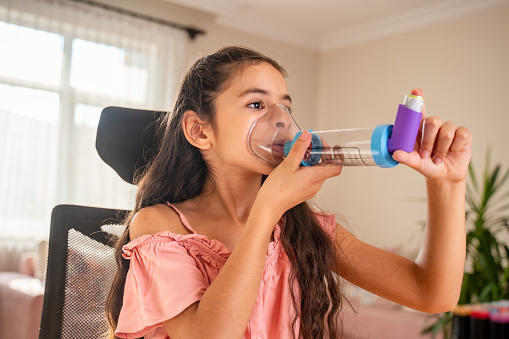AsthmaCOMP Success Story

Students across Colorado are receiving better asthma care through the AsthmaCOMP program thanks to funding from the Cancer, Cardiovascular Disease, and Pulmonary Disease (CCPD) Grant program.
Known officially as the Colorado Comprehensive School-Centered Asthma Program, the AsthmaCOMP program focuses on elementary schools with high asthma prevalence. The CCPD grant program, part of the Colorado Department of Public Health and Environment (CDPHE), has funded AsthmaCOMP nearly every year since 2005. AsthmaCOMP has provided the core structure that enabled the team to obtain additional funding from the National Heart, Lung and Blood Institute to support regional sites across the State of Colorado.
Through the AsthmaCOMP model, asthma counselors now embedded in schools across the state help provide basic asthma education for families and teach them asthma self-management. For example, children who enroll in the program receive an asthma toolkit, which contains a spacer device and a peak flow meter, to help children learn to treat their asthma. The students can also receive quick-relief medication and an asthma care plan specifically for managing asthma at their school.
Oftentimes, barriers to care and access to basic resources contribute to poor asthma control. Fortunately, our asthma counselors screen for social determinants of health and refer families to community resources. This support has helped families and ultimately led to better asthma control. The program also strengthens the “circle of support” for students by engaging health care providers and facilitating communication with the family, school nurse, and health care provider.
AsthmaCOMP also provides training and resources for school nurses. More than 100 school nurses across the state have joined a professional development program and peer learning for asthma management - those nurses also receive the asthma toolkits and participate in webinars.
According to Stanley Szefler, director of the Breathing Institute's Pediatric Asthma Research Program at Children's Hospital Colorado, CDPHE's support has been instrumental to helping grow the AsthmaCOMP program, which he helps oversee.
“CDPHE has challenged us to grow and expand our horizons for what we can accomplish,” Szefler said.
For example, the CCPD grant program has encouraged AsthmaCOMP to expand beyond the Denver metro area. AsthmaCOMP support is now offered in cities and counties such as Colorado Springs, Greeley, Lamar, and Grand Junction. AsthmaCOMP has reached more than 5,000 Coloradans since the program began.
“AsthmaCOMP’s growth and positive reputation have sparked school districts to ask how they can become part of it,” says Melanie Gleason, project manager for AsthmaCOMP.
“Seeing people want to be involved speaks to the success of the program.”
And students are benefiting from the AsthmaCOMP program. Since AsthmaCOMP began, the schools that participate in the program across the state report that the approximately 200 students who participate each year improve their school attendance and participate in more school activities while improving their overall asthma control and self-care.
Because the students know when to seek help for their asthma, that limits the clinical impact, and students and their families experience fewer emergency room and hospital visits.